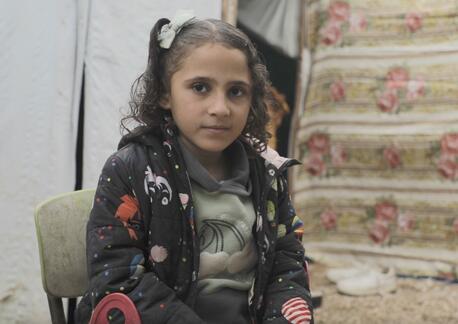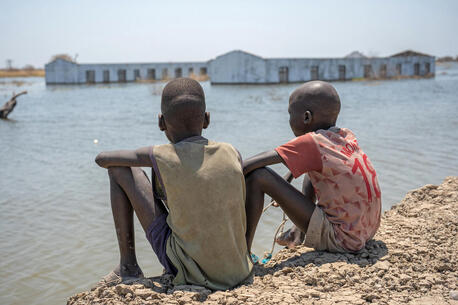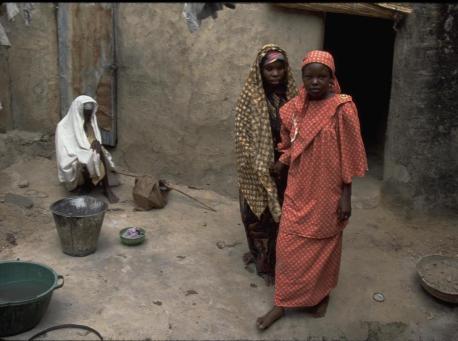On the Road in Uganda—This Is the World's Fastest-Growing Refugee Camp
Waves of refugees from South Sudan have poured into Uganda to escape escalating violence and famine. UNICEF USA's Justin Hemenway traveled with UNICEF Uganda for an up close and personal view of UNICEF's humanitarian response to the world's fastest-growing refugee crisis — Uganda now hosts more than 800,000 South Sudanese refugees. Justin's story:
DAY 1: WELCOME TO UGANDA
"Welcome to Uganda, we're good people," a woman calls out to a group of refugees as they step off the bus. I am at the Imvempi reception center in northwest Uganda. It is the beginning of my field visit, the first stop following a seven-hour journey over bumpy roads from Kampala.
Under a blazing sun, one bus after another pulls up with new arrivals. They are mostly women and children, very few men, all from South Sudan. Most look tired and uncertain as they join the queue to register. But they also seem relieved to finally be in a safe place. Here in Uganda, they won't starve and they won't be attacked.
Newly arrived refugees from South Sudan wait to register at the Kuluba reception center in Koboko district, northwest Uganda. © UNICEF/Jiro
Here at Imvempi, refugees are welcomed with open arms. They are given ration cards listing food items and other staples to be picked up at a nearby supply tent. I duck inside a health clinic, where children are screened for malnutrition and given the miracle food, therapeutic peanut paste, if they need it.
Children get vaccinated here, too. Workers from UNICEF and other agencies, our partners on the ground, man the separate stations for measles, polio and tetanus. I am inspired watching everybody work together as a team to meet the needs of all these kids who have been through so much.
"Welcome to Uganda, we're good people" a woman calls out to a group of refugees from South Sudan as they step off the bus.
Later in the day, I am at the nearby Bidi Bidi settlement, where refugees are given their own plots of land to farm and materials to build a house. Seeing all this activity makes me understand why Uganda is considered to have one of the most generous and progressive refugee policies in the world. It seems like a place where you could find your footing and maybe make a fresh start.
South Sudanese refugee kids get a chance to play and have fun at a child-friendly space UNICEF supports at the Bidi Bidi settlement. © UNICEF/Ose
As I walk around the settlement I see so many people hard at work, digging latrines and constructing round huts with thatched roofs. The homes are not all crowded together as I had imagined they would be. They appear in small clusters with lots of space in between where families can plant maize and cassava and other crops.
At the new water pump on the hill, I see children and mothers congregating, jerry cans and buckets in hand. The pump is making it easier for everybody in the area, refugees and locals alike, to access clean safe water.
Digging latrines is one way refugees are pitching in to improve conditions at the Bidi Bidi settlement, home to 272,000 South Sudanese — about half of those who fled to Uganda in 2016. © UNICEF/Jiro
It was at Bidi Bidi where I met Anthony. The young man's family had left South Sudan for Uganda years ago, then returned home in the hopes that conditions had improved. They hadn't. He fled back to Uganda again. Anthony had put himself in charge of building a house for his parents and younger siblings. He had set up a temporary shelter out of a few wooden poles and a tarp while he worked on the more permanent dwelling. He seemed a lot older than his 17 years.
DAY 2: IN THE BIDI BIDI SETTLEMENT
Today, I find myself surrounded by young children almost everywhere I go. I am back at Bidi Bidi, at a Child-Friendly Space where preschoolers are gathered to get the kind of stimulation that is so important for early development. Outside, the play yard is teeming with children on swings, seesaws and slides. They are singing and clapping — kids just being kids. And they keep running up to me to say "Hello," to shake my hand and to give me high-fives and fist bumps. They are so friendly and curious.
To be on the receiving end of such warmth feels incredible. Later on in the day, while in the car heading back to our hotel, I struggle to process these feelings. The children's smiles and light-heartedness seem at odds with the uncertainty of their futures. Their needs are so great. I wonder what will happen to them all. Will they all get a chance to really flourish? Will they all be able to go on and do great things?
Liesl Copland of William Morris Endeavor Entertainment (WME), a UNICEF USA partner, bonds with refugee children during a field visit to the Bidi Bidi settlement in Uganda’s Yumbe district. © UNICEF/Jiro
I am particularly struck by the plight of children who cross the border on their own. Young girls like Joyce, 16. (Her name has been changed to protect her identity.) Joyce tells me how she lost track of her sister the day their village was attacked. For weeks she didn't know whether she was alive or dead. She has since heard that her sister is safe in another settlement. Still, it was tough hearing Joyce tell this story in her matter-of-fact way, as if the commonality of her tale made it somehow unremarkable.
I am pleased to learn that Joyce has a foster mom, another refugee named Tabu who has two children of her own, ages 4 and 7. Tabu tells me how happy she is to help watch over Joyce and two other unaccompanied teens while UNICEF works to track down the parents.
DAY 3: JURUMUNDI PRIMARY SCHOOL
I am at the Jurumundi primary school, where the classrooms are jam-packed with students and school supplies are scarce. It is a reminder that while much of the focus these days is on meeting the needs of refugees, the local host community has some serious needs as well. Uganda is a poor country, and the stress and strain of having quietly accepted nearly half a million refugees last year — more than all European countries put together — is becoming increasingly evident.
And as I pack my things to head back to Kampala and to the plane that will fly me home to New York, I wonder what will happen to the children we can't reach.
Refugee children from South Sudan head home after a day of learning at a UNICEF-supported school inside Uganda’s Nyumanzi settlement. © UNICEF/Jiro
While I find it heartening that I was able to see firsthand how many children are receiving help, and to witness the dedication and determination of those on the front lines of the relief effort, I worry how long we can keep it up. There's hope in Uganda. Great things are happening. But there's still a tremendous amount of work to be done.
Your support is critical. Support UNICEF's efforts to aid the children of South Sudan.
UNICEF USA traveled to Uganda with representatives from LDS Charities and William Morris Endeavor Entertainment in early March. The group spent three days visiting refugee reception centers, settlements and other facilities supported by UNICEF and partners as part of the ongoing relief effort. Among the assistance goals for 2017: vaccinate more than 1 million children against measles, provide 440,000 children with nutritional supplements and secure safe water for drinking, cooking and personal hygiene for more than half a million people.
p.p1 {margin: 0.0px 0.0px 0.0px 0.0px; font: 14.0px Calibri; -webkit-text-stroke: #000000} span.s1 {font-kerning: none}
Sister Jean Bingham of LDS Charities gets a warm welcome at an ECD center in Uganda's Bidi Bidi settlement. © UNICEF/Ose
HOW TO HELP
There are many ways to make a difference
War, famine, poverty, natural disasters — threats to the world's children keep coming. But UNICEF won't stop working to keep children healthy and safe.
UNICEF works in over 190 countries and territories — more places than any other children's organization. UNICEF has the world's largest humanitarian warehouse and, when disaster strikes, can get supplies almost anywhere within 72 hours. Constantly innovating, always advocating for a better world for children, UNICEF works to ensure that every child can grow up healthy, educated, protected and respected.
Would you like to help give all children the opportunity to reach their full potential? There are many ways to get involved.





